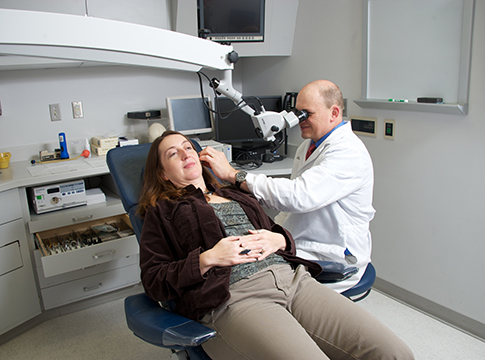Hidden Symptoms That an Otorrinolaringologia Expert Can Diagnose Before They Worsen
Hidden Symptoms That an Otorrinolaringologia Expert Can Diagnose Before They Worsen
Blog Article
Exploring the Field of Otolaryngology: What to Anticipate When You Speak With an ENT
Otolaryngology, frequently referred to as ENT, includes the diagnosis and therapy of ear, nose, and throat disorders. For those experiencing relevant problems, seeking advice from an ENT specialist can give quality and relief. Recognizing what to anticipate during such appointments is crucial for efficient interaction and care. This summary will describe vital elements of the ENT experience, consisting of usual factors for sees and the procedures associated with diagnosis and therapy.

Comprehending Otolaryngology: An Overview
Otolaryngology, frequently described as ENT (Nose, throat, and ear) medicine, is a specialized branch of medicine that concentrates on the diagnosis and therapy of conditions affecting these vital areas of the body. This field includes a variety of conditions, including those pertaining to hearing, equilibrium, respiratory system function, and speech. Otolaryngologists are educated to handle both surgical and clinical therapies, making use of sophisticated techniques and innovations. Their competence prolongs beyond conventional ailments, attending to issues such as allergic reactions, sinus infections, and hearing loss. Furthermore, they play an essential duty in the administration of head and neck cancers, offering extensive treatment customized to private person demands. On the whole, otolaryngology stays vital for keeping health and top quality of life in affected people.
Typical Factors to See an ENT Specialist
Several individuals seek the knowledge of an ENT professional for a variety of factors, mirroring the varied nature of conditions that affect the nose, throat, and ear. Usual concerns consist of chronic sinusitis, which typically leads to persistent nasal blockage and facial pain. Allergic reactions and their connected signs, such as sneezing and itching, additionally prompt visits to these professionals (Otolaryngologist). Hearing loss, whether steady or abrupt, is an additional substantial factor for examination. On top of that, people may look for examination for throat conditions, consisting of relentless hoarseness or ingesting difficulties. Rest apnea, characterized by disturbed breathing during rest, is regularly attended to by ENT specialists. Each of these conditions highlights the relevance of specialized care in handling complicated ENT-related health issues
Planning for Your ENT Appointment
When planning for an ENT appointment, it is vital to collect relevant information and think about any kind of certain concerns. Patients must put together a thorough case history, including previous ear, nose, or throat issues, surgeries, and existing medicines. Documenting symptoms-- such as period, frequency, and seriousness-- can give beneficial insights for the ENT professional. In addition, individuals should prepare a list of questions they desire to ask, making sure that all issues are addressed during the visit. Bringing along any type of appropriate medical records or test outcomes can even more aid the ENT in comprehending the person's condition. Patients need to verify their consultation details, including time, date, and place, to minimize any kind of last-minute complication. Proper preparation can enhance the performance of the assessment and cause better end results.
What to Expect During the Examination
As the assessment begins, the person can anticipate to take part in a detailed discussion with the ENT expert concerning their symptoms and case history. The expert will certainly ask about the duration, regularity, and intensity of signs and symptoms such as hearing loss, nasal blockage, or sore throat. In addition, the client's previous medical conditions, drugs, and any kind of pertinent family members history will certainly be evaluated, assisting the specialist in developing a full understanding of the person's health and wellness. The ENT might also inquire about way of life aspects, such as direct exposure to irritants or irritants. This open dialogue develops a structure for the examination, making sure that the individual's worries are addressed and setting the phase for any kind of essential assessments or referrals for treatment.
Analysis Examinations and Procedures in Otolaryngology
A series of diagnostic examinations and treatments are important in otolaryngology to precisely review and detect problems affecting the throat, nose, and ear. Typical tests consist of audiometry, which measures hearing function, and tympanometry, evaluating middle ear pressure. Nasal endoscopy allows visualization of the nasal flows and sinuses, while laryngoscopy takes a look at the throat and vocal cords. Imaging methods, such as CT scans and MRIs, supply comprehensive sights of head and neck structures. Allergic reaction screening might also be performed to determine triggers for sinus or respiratory problems. These diagnostic tools enable ENT experts to create a comprehensive understanding of clients' problems, making certain tailored and efficient monitoring strategies. Proper diagnosis is essential for effective treatment outcomes in otolaryngology.
Treatment Alternatives Used by ENT Specialists
ENT experts use a selection of therapy options customized to address details conditions affecting the ear, throat, and nose. These treatments vary from traditional approaches, such as medication and way of life adjustments, to even more invasive treatments. For instance, allergies may be handled with antihistamines or immunotherapy, while persistent sinusitis might require nasal corticosteroids or sinus surgery. For hearing loss, ENT professionals typically advise listening device or surgical treatments like cochlear implants. In instances of throat problems, choices can consist of speech treatment or operations to eliminate obstructions. In addition, they might give advice for handling rest apnea, consisting of using CPAP tools or surgical interventions. On the whole, the goal is to improve individuals' lifestyle via customized treatment and efficient therapy methods.
When to Look For Follow-Up Care With an ENT
When to look for follow-up care with an ENT professional is vital for managing recurring symptoms or difficulties related to ear, throat, and nose problems, identifying. Clients should consider arranging a follow-up appointment if signs and symptoms continue regardless of preliminary treatment, such as persistent ear discomfort, nasal congestion, or throat discomfort. Modifications in hearing, balance problems, or uncommon nasal discharge may likewise require more examination. Additionally, if an individual experiences adverse effects from suggested medications or has actually undertaken a surgical treatment, follow-up treatment is necessary to check recovery and resolve any type of concerns. Prompt appointments can assure efficient monitoring of problems, prevent prospective difficulties, and provide satisfaction regarding one's wellness. Seeking follow-up treatment promotes proactive health and wellness monitoring in otolaryngology.
Often Asked Questions

What Credentials Should I Look for in an ENT Expert?
When looking for an ENT specialist, one ought to seek board accreditation, pertinent experience, and strong patient evaluations. Furthermore, reliable communication abilities and a thoughtful strategy can considerably improve the general treatment experience.
Exactly how Do I Select the Right ENT for My Requirements?
Choosing the best ENT specialist includes reviewing their certifications, experience, and client reviews (Otolaryngology). It is important to contemplate their communication more helpful hints style and method to therapy, guaranteeing they line up with the individual's details health requirements and preferences
Are There Any Type Of Dangers Connected With ENT Procedures?
The risks connected with ENT treatments might include infection, bleeding, anesthesia issues, and find more information possible damages to bordering structures. Individuals should review these threats with their doctor to recognize individual issues and warranty educated choices.
Exactly How Can I Handle Stress And Anxiety Before My ENT Visit?
To manage stress and anxiety before a visit, people can exercise deep breathing workouts, envision favorable outcomes, prepare questions beforehand, and look for support from good friends or household, cultivating a feeling of peace of mind and calmness.
What Should I Do if I Experience Side Results From Therapy?
The individual needs to without delay report them to their health care copyright if side impacts from treatment take place. Modifications to therapy or added interventions may be required to ensure safety and security and effectiveness in handling their problem - ENT Clinic. As the consultation starts, the patient can expect to involve in a detailed discussion with the ENT specialist concerning their signs and symptoms and clinical background. These diagnostic devices allow ENT experts to establish a complete understanding of people' conditions, guaranteeing customized and effective administration strategies. ENT specialists use a variety of therapy choices tailored to address particular problems influencing the ear, throat, and nose. When seeking an ENT specialist, one must look for board qualification, relevant experience, and solid individual useful content testimonials. Selecting the right ENT specialist involves assessing their credentials, experience, and person testimonials
Report this page